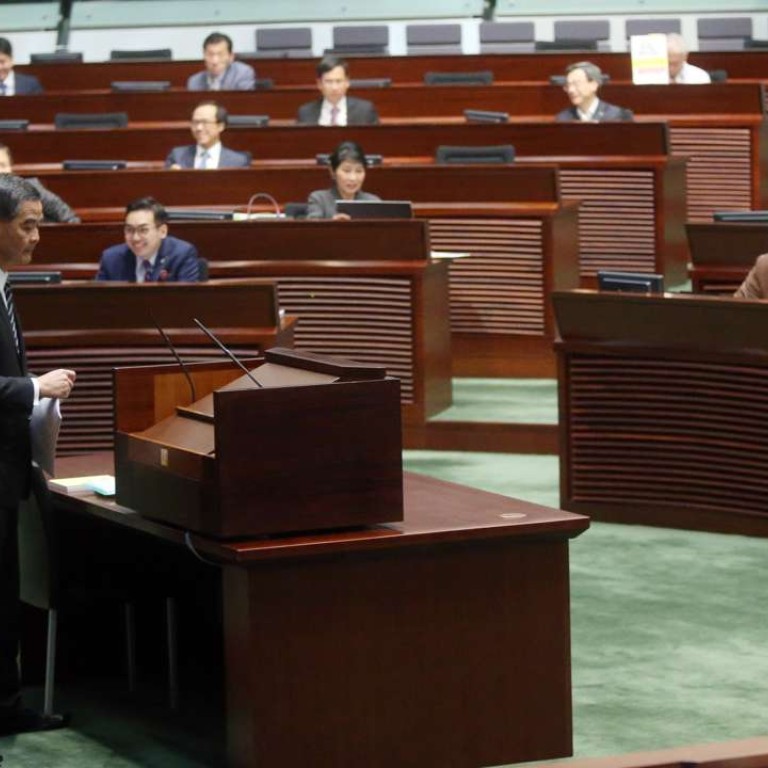
CY Leung has made many enemies, but they might miss him when he’s gone
Stuck between opposing forces, caught out by timing, and in adverse conditions, the city’s lame-duck leader was never going to bask in glory
After Chief Executive Leung Chun-ying’s farewell policy address, Alex Lo takes a look at a bruising tenure for an unexpected election winner who made more enemies than friends
Leung Chun-ying began his tenure as a “wolf” and is ending it as a lame duck. Between his first day in July 2012 and his farewell policy address on Wednesday, he has been called many names. From big business to democracy advocates, he has made more enemies than friends.
The unexpected winner in the last chief executive race, he was never able to rely on the powerful groups allied with the local business community or political parties and leftist unions with close ties to the mainland’s centres of power.
The once-friendly Liberal Party has, at times, effectively joined the opposition. The real estate sector objects to Leung’s policy of increasing housing land supply and so-called spicy measures to curb rampant property speculation.
The influential Heung Yee Kuk, which claims to speak for much of the rural areas in the New Territories, deeply distrusts his administration.
Meanwhile, the pan-democratic opposition took every opportunity to snipe at the government. Even before Leung started work, there were street protests calling for his head. As soon as he took office, a major political crisis took shape – the furore over the national education curriculum for public schools.
That education programme was developed by the previous government, and the Leung administration had the misfortune of having to introduce it. Coming at a time of high anti-mainland sentiment, it was denounced as “brainwashing” for local pupils. Opposition quickly spread; many of its young leaders were promoted to the forefront of local politics. They would go on to lead the Occupy protests for universal suffrage more than two years later.
Though his government eventually backed down and allowed schools to decide whether or not to take up national education, Leung earned no goodwill, only more bitter attacks and distrust.
He had a mandate to introduce electoral reform for universal suffrage, but he held it off for two years. During that time, he focused on housing and enhancing welfare programmes, whose costs he would almost double.
But by the time he launched the public consultation on political reform in 2014, democracy activists were ready to occupy the streets of Admiralty, Causeway Bay and Mong Kok.
The main democracy groups wanted all or nothing. This provoked a hardline response from Beijing. The Leung government was caught in the middle. The bitter and, at times, violent protests over three months hardened the stance of pan-democratic politicians in the legislature and compelled them to vote down the government’s reform package. Leung’s popularity dropped to an all-time low.
Watch: Leung Chun-ying announces he will not seek a second term
The Occupy protests had helped radicalise a whole generation of young activists, many of whom became disillusioned with old-style democratic peaceful resistance. Talk of violence, revolution and spilling blood became more prevalent in such circles. One could draw a straight timeline from the end of the Occupy protests to the riot on the first day of the Lunar New Year in 2016.
The worst civil unrest since the 1967 riots, the all-night violence in the streets of Mong Kok, and TV footage of rioters’ assaults on police officers further cemented the radical image of the localism.
A movement that Leung aimed to nip in the bud, localism has instead spread like wildfire, catapulting several of its advocates into the Legislative Council. The government has been put on the defensive and been fighting to eject them from the legislative chamber in the courts, leading to further charges that Leung disregards direct election results.
For many, Leung has become a symbol of everything that has gone wrong in Hong Kong. But the adverse circumstances of local politics make it hard, if not impossible, for anyone to govern effectively. When he leaves, we may miss having such a convenient figure to kick around.

